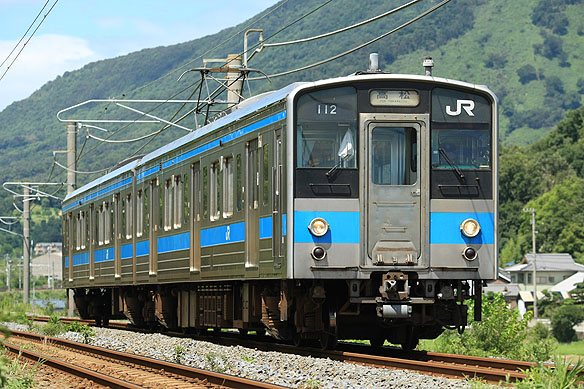Background and overview
Japanese National Railways (JNR) developed 121 series suburban DC electric multiple unit (EMU) trains for the regional services on the electrified Yosan line between Takamatsu and Sakaide and between Tadotsu and Kan'onji and the electrified Dosan line between Tadotsu and Kotohira in 1986. 19 2-car sets consisting of one powered vehicle and one trailer vehicle were built over the period from November 1986 until January of the following year.
Car body
They have a 2800mm wide body incorporating light weight stainless construction. Bodies are unpainted and have a beige, brown, white and blue waistline band running the length of each car below the windows. The bodies are unpainted and have a cherry sangria waistline and headline bands running the length of each car below and above the windows. The gangwayed cab end, the corner of which is covered decorative FRP frames, employs glabled shape and raised driver's cab. Electrolytic colouring aluminum black plates are fitted around windscreens and above the gangway door. A destination rollsign is fitted above the gangway door and a train operation identifier sign is above a windscreen on the co-drive's side. They are equipped with three 1300mm wide double-leaf automatic sliding doors and two single-hung windows and two door case windows between the sliding doors. Door operating equipments, TK8A, allowing hand operation to prevent the passenger's room from being cold in winter are fitted on the door header of the sliding doors. They are equipped with an air conditioner, AU79A, rated at 33,000kcal/h on the centre of the roof and forced draught ventilators on both sides of the air conditioner. Loudspeakers, providing guidance broadcast for passengers waiting at a station, are fitted on each side of the body. They are also equipped with an automatic jumper coupler to ease rush-up operations.
Bogies
The motored bogies are DT33 applying for MT55 traction motors and trailer bogies are DT21T, featuring secondary coil suspension, coil spring primary suspension with pedestal guide. DT21T bogies are transplanted from disused 101 series vehicles. The parallel cardan drive with hollow shaft is applied for the power transmission device. The gear ratio is 6.07. Motored bogies employ the single tread brake rigging and trailer bogies employ the double tread brake rigging.
Traction unit and ancillary equipments
Four series-wound brushed DC traction motors, MT55A, with a power output of 110kW are controlled by the armature-resistance traction control system, CS51A, fitted on powered end vehicles, class kumoha121. Class kumoha121 vehicles are also equipped with a motor generator, MH94-DM58 or MH94A-DM68A which are transplanted from disused class sahashi481 and sahashi581, with a power output of 70kVA and a motor driven air compressor, MH80A-C1000, under their floor and c a current pickup, PS16, on their roof. The brake system is the electric command pneumatic brake with rheostatic brake.
Accommodation
They have a mixture of longitudinal bench seating with 1490mm seating pitch. Longitudinal bench seating is located beside the door. Straps are fitted above the longitudinal seating. The air conditioning duct is fitted above the ceiling to improve interior design, and slit-shaped AC vents are employed. They are equipped with no toilet.
Modifications
The modification of colure bands
The colour of waist and headline bands were changed to light blue over the period from September 1987 until October of the same year.
Current pickup replacement
121 series operations extended to Iyo-Saijyo at the start of the newly electrified Yosan line between Kan'onji and Niihama in July 1992. This causes the current pickup replacement to S-PS58 designed for small cross section of tunnels because a cross section of some tunnels located on the extended route is small over the period from April 1992 until June of the same year.
Auxiliary power supply replacement
An auxiliary power supply, S-SIV90, with a power output of 90kVA was fitted kuha120-18 and -19 beneath the floor and the motor generator which kumoha121-18 and 19 was removed over the period February 1998 until March of the same year. Furthermore, a motor generator which class kumoha121 vehicles excepting kumoha-18 and -19 was displaced with an auxiliary power supply, S-SIV70 with a power output of 70kVA.
Modifications for conductor-less operation
Background and overview
Kumoha121/kuha120-1 and -2 received modifications for conductor-less operation in 2011.
Car body
The colour of waist and headline bands were changed into cherry sangria. The destination rollsign was changed into motored. The upper part of a window located at the rear of the body was filled to be equipped with the LED destination display. In addition, anti-fall plates between vehicles are also introduced excepting the cab end.
Accommodation
Transverse seating bays located at the front right and rear left of the passenger room were replaced with longitudinal bench seating and additional straps are fitted above the newly constructed longitudinal seating. Additional electric heaters and the fare box were fitted where bench seating located behind the cab was removed. The fare chart seven segment display is located above the partition door to separate the driver's cab and the passenger room. The numbered ticket machine, which put the ticket indicating the boarding station, is located beside doorways at the left rear of their body. A LED display for providing passenger information is fitted above the door located at the rear end.
Operations
121series entered regional services on the Yosan line between Takamatsu and Sakaide and between Tadotsu and Kan'onji and the Dosan line between Tadotsu and Kotohira in March 1987. They subsequently entered regional and rapid services on the Yosan line between Takamatsu and Kan'onji and the Dosan line between Tadotsu and Kotohira in October 1987 at the complement of electrification between Sakaide and Tadotsu. 121 series operations extended to Iyo-Saijyo at the start of the newly electrified Yosan line between Kan'onji and Niihama in July 1992.
However, 121 series were gradually withdrawn due to the start of conversion to 7200 series in 2016. Eventually, they had completely withdrawn in 2019. |
|



